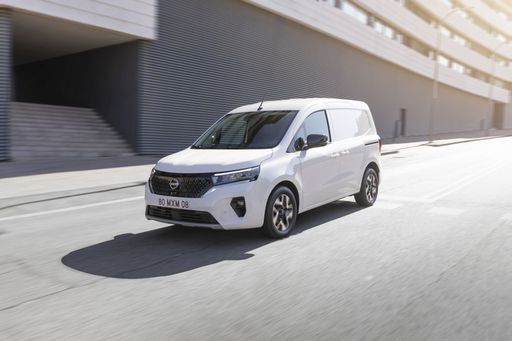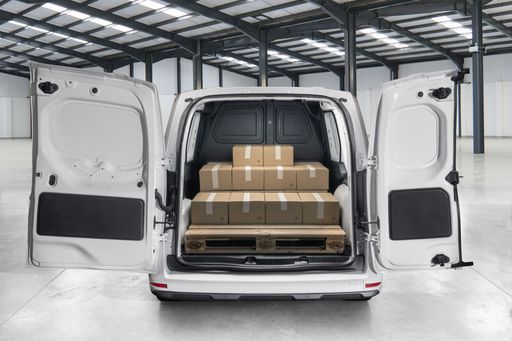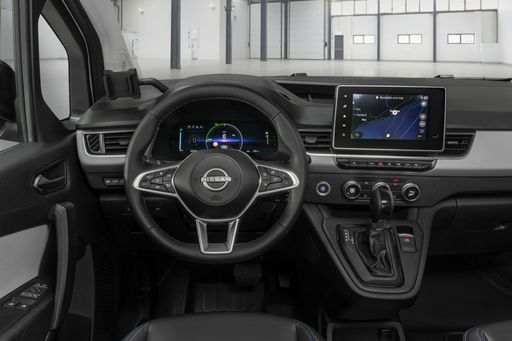Ford Transit Connect vs Nissan Townstar - Differences and prices compared
Compare performance (150 HP vs 130 HP), boot space and price (26700 £ vs 25700 £ ) at a glance. Find out which car is the better choice for you – Ford Transit Connect or Nissan Townstar?
Costs and Efficiency:
Looking at overall running costs, both models reveal some interesting differences in everyday economy.
Nissan Townstar has a barely noticeable advantage in terms of price – it starts at 25700 £ , while the Ford Transit Connect costs 26700 £ . That’s a price difference of around 1019 £.
Fuel consumption also shows a difference: Ford Transit Connect manages with 0.50 L and is therefore significantly more efficient than the Nissan Townstar with 6.70 L. The difference is about 6.20 L per 100 km.
As for electric range, the Nissan Townstar performs decisively better – achieving up to 281 km, about 163 km more than the Ford Transit Connect.
Engine and Performance:
Power, torque and acceleration say a lot about how a car feels on the road. This is where you see which model delivers more driving dynamics.
When it comes to engine power, the Ford Transit Connect has a somewhat edge – offering 150 HP compared to 130 HP. That’s roughly 20 HP more horsepower.
In acceleration from 0 to 100 km/h, the Ford Transit Connect is a bit quicker – completing the sprint in 11.40 s, while the Nissan Townstar takes 12.60 s. That’s about 1.20 s faster.
In terms of top speed, the Ford Transit Connect performs minimal better – reaching 186 km/h, while the Nissan Townstar tops out at 183 km/h. The difference is around 3 km/h.
There’s also a difference in torque: Ford Transit Connect pulls clearly perceptible stronger with 350 Nm compared to 245 Nm. That’s about 105 Nm difference.
Space and Everyday Use:
Whether family car or daily driver – which one offers more room, flexibility and comfort?
Seats: Nissan Townstar offers noticeable more seating capacity – 7 vs 5.
In curb weight, Ford Transit Connect is hardly perceptible lighter – 1477 kg compared to 1509 kg. The difference is around 32 kg.
In maximum load capacity, the Ford Transit Connect performs slightly better – up to 3700 L, which is about 650 L more than the Nissan Townstar.
When it comes to payload, Ford Transit Connect slightly takes the win – 792 kg compared to 641 kg. That’s a difference of about 151 kg.
Who wins the race in the data check?
The Ford Transit Connect is decisively ahead in the objective data comparison.
This result only shows which model scores more points on paper – not which of the two cars feels right for you.
Costs and Consumption
View detailed analysis
Engine and Performance
View detailed analysis
Dimensions and Body
View detailed analysis

Ford Transit Connect
Ford Transit Connect
The Ford Transit Connect is the go-to compact workhorse for urban professionals who need cargo space without driving a full-size van. It balances practicality and everyday manners with clever storage ideas and a surprisingly comfortable ride, making it a sensible choice for small businesses and families who value function over flair.
details


Nissan Townstar
The Nissan Townstar is a pragmatic city companion that blends clever packaging with a calm, easygoing drive, making it ideal for urban errands and small-business hauls. It won't win any style contests, but its tidy interior, sensible features and no-nonsense character make it a genuinely useful buy for people who value practicality over pizzazz.
details


Costs and Consumption |
|
|---|---|
|
Price
26700 - 41500 £
|
Price
25700 - 37700 £
|
|
Consumption L/100km
0.5 - 5.8 L
|
Consumption L/100km
6.7 - 7 L
|
|
Consumption kWh/100km
-
|
Consumption kWh/100km
19.3 - 20.7 kWh
|
|
Electric Range
118 km
|
Electric Range
265 - 281 km
|
|
Battery Capacity
19.70 kWh
|
Battery Capacity
45 kWh
|
|
co2
11 - 153 g/km
|
co2
0 - 157 g/km
|
|
Fuel tank capacity
32 - 50 L
|
Fuel tank capacity
54 L
|
Dimensions and Body |
|
|---|---|
|
Body Type
Cargo Van
|
Body Type
High Roof Estate
|
|
Seats
2 - 5
|
Seats
5 - 7
|
|
Doors
4
|
Doors
5
|
|
Curb weight
1477 - 1866 kg
|
Curb weight
1509 - 2041 kg
|
|
Trunk capacity
-
|
Trunk capacity
0 - 775 L
|
|
Length
4500 - 4868 mm
|
Length
4488 - 4911 mm
|
|
Width
1855 mm
|
Width
1859 - 1860 mm
|
|
Height
1856 - 1860 mm
|
Height
1838 - 1869 mm
|
|
Max trunk capacity
2500 - 3700 L
|
Max trunk capacity
2800 - 3050 L
|
|
Payload
602 - 792 kg
|
Payload
506 - 641 kg
|
Engine and Performance |
|
|---|---|
|
Engine Type
Diesel, Plugin Hybrid
|
Engine Type
Petrol, Electric
|
|
Transmission
Manuel, Automatic
|
Transmission
Manuel, Automatic
|
|
Transmission Detail
Manual Gearbox, Dual-Clutch Automatic
|
Transmission Detail
Manual Gearbox, Dual-Clutch Automatic, Reduction Gearbox
|
|
Drive Type
Front-Wheel Drive, All-Wheel Drive
|
Drive Type
Front-Wheel Drive
|
|
Power HP
102 - 150 HP
|
Power HP
122 - 130 HP
|
|
Acceleration 0-100km/h
11.4 - 13.5 s
|
Acceleration 0-100km/h
12.6 - 13.3 s
|
|
Max Speed
175 - 186 km/h
|
Max Speed
135 - 183 km/h
|
|
Torque
280 - 350 Nm
|
Torque
240 - 245 Nm
|
|
Number of Cylinders
4
|
Number of Cylinders
4
|
|
Power kW
75 - 110 kW
|
Power kW
90 - 96 kW
|
|
Engine capacity
1498 - 1968 cm3
|
Engine capacity
1332 cm3
|
General |
|
|---|---|
|
Model Year
2024 - 2025
|
Model Year
2023 - 2025
|
|
CO2 Efficiency Class
E, B
|
CO2 Efficiency Class
E, F, A
|
|
Brand
Ford
|
Brand
Nissan
|
What drive types are available for the Ford Transit Connect?
The Ford Transit Connect is available as Front-Wheel Drive or All-Wheel Drive.
